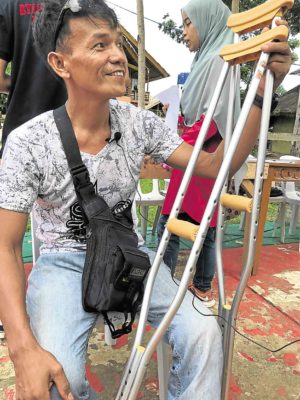ISABELA CITY — Nearly two years after he surrendered on July 6, 2016, Motong Indama has yet to live a normal life.
Indama, now 29, joined Abu Sayyaf at the age of 16. His decision to surrender was difficult to make.
“They have been threatening my family,” he said of former Abu Sayyaf gang mates.
“I have to look for a safer place so my children can go to school and finish their studies,” said Indama, whose surrender was made more unacceptable to Abu Sayyaf because he was a nephew of the group’s leader in Basilan province, Furuji.
Indama had to leave his village to stop his former gang mates from harassing him and his family.
Janatin Madjakin, another surrendered Abu Sayyaf bandit, faced the same threats.
Threat of beheading
“They told me that once they get hold of me, they are going to cut my head,” Madjakin said.
Furuji, Madjakin said, was incensed at his surrender and wanted to behead him personally.
But like more than 200 Abu Sayyaf members who had surrendered in Basilan, Indaman and Madjakin were determined to live a new life, one far from the violence they had been familiar with for years.
Indama was born into a family of guerrillas. His father, Bombo, died as a Moro National Liberation Front commander.
“I was young and I didn’t know that what we were doing was bad or illegal,” Indama said.
“Until I started a family and I became envious of others who enjoy the freedom to move around and see their children going to school,” he said.
“I thought it was OK to carry firearms and fight soldiers,” Indama said. “That was how we were reared then,” he added.
Madjakin was raised the way Indama was.
Growing up with guns
“We grew up with guns,” Madjakin said. He said when he was an elementary student, “I already joined the battle” against government soldiers.
Madjakin said he was just 18 years old when he joined Abu Sayyaf “because they offered better weapons and some allowances.”
Indama and Madjakin rose through the ranks of Abu Sayyaf, becoming subleaders.
“Furuji said I am brave so they made me a subleader,” said Madjakin. “I operated with several men under me,” he added.
Madjakin, now 42, said the new life he found after his surrender was very far from his days in the jungle.
He said as member of Abu Sayyaf he used to chew wood chips and leaves out of hunger and pretend that these were real food.
Imaginary food
“Good food was an imagination,” Madjakin said. “In the mountain, we just imagined how real food looks like,” he said.
Even during Eid al-Fitr, one of the biggest celebrations for Muslim, there was barely food.
All they had, most of the time, were betel nuts and leaves, Madjakin said.
Food sometimes came when someone brave enough to pass by Abu Sayyaf camp would offer instant noodles.
“Our life was about hiding, running and loving our firearms,” Madjakin said.
“I know I have killed or hit soldiers in so many battles in the past,” he added.
Maj. Gen. Juvymax Uy, head of the antiterror Joint Task Force Basilan, said the surrender of more than 200 Abu Sayyaf men in Basilan brought peace to the province.
Uy said since he was assigned to Basilan on Feb. 11, 2017, “no kidnapping has taken place.”
Tourists returning
As a result of the surrender of Abu Sayyaf men, he said tourism has started returning to Basilan.
“Our soldiers, our units are now devoted to tourist protection and security,” Uy said. “In the past, our time was devoted to pursuing and hunting down these bandits,” he said.
He estimated that at least 40 Abu Sayyaf men were still in Basilan but the number was too small to have an impact on peace and order.
Before 2017, Uy recalled that Basilan got only some 400 tourists at most in a year.
“Now in a day, we receive more than 3,000 tourists,” he said.
Gov. Mujiv Hataman, of the Autonomous Region in Muslim Mindanao, said economic development in Basilan, brought about by government intervention, has apparently helped in turning around the peace and order situation.
“One of the ways we saw best to address the security issues is to provide them an environment to work and they will forget what it’s like in the jungle,” Hataman said.
